Bourke Ulick J. Easy lessons, or Self-instruction in Irish / Легкие уроки: самоучитель ирландского языка
Подождите немного. Документ загружается.

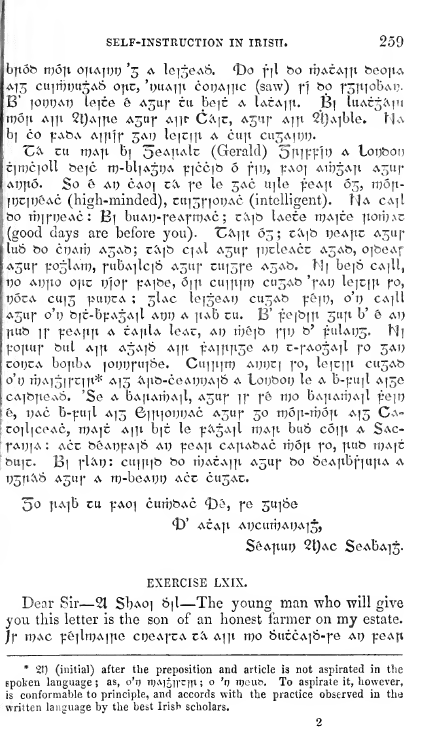
SELF-INSTRUCTION
IN IRISH. 259
b^tob
n)ó|t 0]tA]T)T)
'5
A
leijeAÓ.
<Do
f
|l
bo
TbACA]|i
fcieo|iA
A-I5
cuirbt)U5A6
o|ic,
'í;uai]i
cor)Ai]tc
(saw)
X]
^9
TST^I'^^^'^-
B' ]oy)\)<\v
Iqce é
A3u|*
cii he]t
a
lACAjft.
B]
luAcj^in
rr)ófi
Ai|t
2l)A]|te
A5uf
A]ir
C^ic,
a5'4}* a]|i
^t^A^ble.
Ma
b] CO
i-'AbA
A]|ti|*
5AI)
le]C|]t
A
cu]i cu5A|i)i;.
"Civ
cii
Tt)A|i b]
3e<^T^^^^
(Gerald)
^Í^IFFU^
^
tor)boi)
qn7Cioll
bejc Tt)-bl]A5r)A ^|CC|h
5
f]V,
"pAO]
aií)5A|i
A^uf
AT)|tó.
So
6
At) CAO]
civ
^-e le
3AC u]le
f;eA]t
05,
rrjoft-
|r)C]t)&Ac
(high-minded), cu]3|']oi)ac (intelligent).
Ma
ca^I
bo
mifueAc:
B]
buAi>]'eA^*it)Ac
;
z'-xp l^ete
njA]ce |torÍ7.\c
(good
days
are before you). 'C'A]]i
05;
civ|b i)eA|xc
A^uf
lu6 bo
CTjATT) A5Ab;
ci\ib
cjaI a5u|« ]i)cleAcc
A3Ab,
0]beAf
A5U|*
|.'03lArt),
|*ubAilci6
a3u|*
cu]3fe
A3Ab.
M)
be^b
caiU,
T)o Ai;]to
o|ic
tj'joi*
pA^be,
óijt
cuiii]ti)
cH3Ab
'y/w)
lejcifi
fo,
t)ócA
CU13 pui)CA
;
5IAC le)5eAi) cu3Ab
fejo,
o'r)
ca]11
A3ii|' o't;
b|c-bpA5A]l
atjo a
|tAb
cu.
B'
f^ibnt
3ii]t
b' é ai)
Ttub
Tf
^eAft]t
A
cajiIa leAC,
ad
rijejb
X]v
b'
frulAUS.
^1
fO|tU|*
bill
A]|t
A3Al6
A]|t
-pA^|t|t3e
At)
C-f-AOgAll
]*0 3AI)
cot^CA
bojibA
iot)t)|ni]6e. Cu]|viti7
AT)t)C]
fo,
lejciji
cu3Ab
o'l)
n)Ai3i|*CT|t*
A]3
ív]tb-ceAT)T)Ai6 a Loubot)
le
a
b-puil
Ai3e
CAibjteAÓ.
'Se
a
bAftAitJAil,
A3U]'
]y
ye
njo
bAjiArbAil
fe]r)
é,
i)AC b-|ni]l
A13
6i|iioi)t;Ac A5UJ*
30
n)ó]i-n)ó]t
a]3 Ca-
coiliceAC, TTjAic
Ajji h]t
le
"pivSA]!
TT)A]i
biió
cóijt
A Sac-
f
A1)1A
:
ACC
béAT)]:A]6 AT) ^eA|l
CA]tAbAC
TTJÓJl 1*0,
|tllb
njAjC
bu]c.
Bi
flivtj:
cu]|i|b bo
njACAHi
a3ih*
bo
óeAiibfjitjtA
a
t)5^ÍVÓ
A3ll|*
A TD-beAlJl)
ACC
CU3AC.
30
jtA^b ctt ]:ao] curbbAC
<l)é,
^^e
5ui6e
<D'
ACAji
Ar)curbAr)Ai3,
SéAjtUt) 2t)AC
SeAbA^g.
EXERCISE
LXIX.
Dear Sir
—
21 Sb^o]
6]l
—
The young man
who will
give
you
this
letter is the son
of
an honest
farmer on my estate.
)y
TtJAC
^eilTTjAiiae
cr)eA]*CA
civ
a]|i
ido OuccAjO-fe
atj |:eA]t
*
St)
(initial) after the
preposition and
article
is
not
aspirated in
the
spoken
language ;
as,
o't)
njAisivciTt
;
o
'q
tT)eu&.
To
aspirate it,
however,
is
conformable
to
principle, and accords with
the practice observed
in the
written
language by
the
best
Irish
scholars.
2
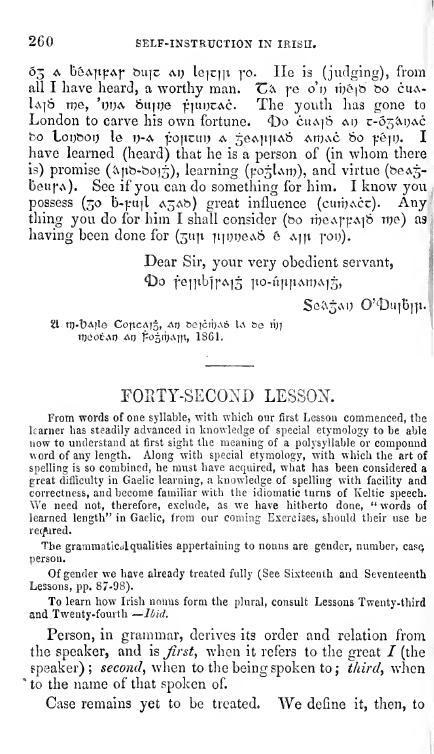
260
SELF-INSTRUCTION
IN
IRISH.
05
A
b&A|tpA|*
feujc
A1) le]c]]i ]*o. He is
(judging), from
all I have
heard,
a worthy
man.
"Civ
fe
o'l; ri)é|& fee cua-
Ia]8 Ti;e, 'i;i;a
oupje
f|ui)CAC.
The youth
has gone to
London
to carve
his own
fortune.
<t)o
cuai6
at)
c-ó5íii;ac
bo
Loo&oi)
le i)-A
fo]izm)
a
5eA]t]iA6 ArtjAC
60
f:éii).
I
have learned
(heard)
that he is
a
person of (in
whom
there
is)
promise (iv|tb-&0)5),
learning
(po5U\it)),
and
virtue
(fc>eA5-
beiifA).
See
if
you can do
something
for
him.
I
know
you
possess
(50
b--f:uil
A5Afc>) great influence
(curbACc).
Any
thing
you
do for him
I shall consider (bo
rbeAfpAiO
nje)
as
having
been done for (5u|t ]t]i;TjeA6
é
A^jt
]*ot)).
Dear
Sir,
your
very obedient
servant,
i)o
feil^birAlS
1io-úítitAn)A|5,
Seí\5sM;
C'Duibnt.
21 tt)'V)A]\e CoticA)5,
At)
bejcrijAó
U
&e
ii;]
TijííotAi) Ai)
posrijAiti,
1861.
rOPtTY-SECOND
LESSON.
From
words
of one
syllable, with which
our first
Lesson
commenced,
the
learner has
steadily
advanced in knowledge
of special etymology
to
be able
now
to
understand at first sight
the meaning
of
a polysyllable
or compound
word
of
any
length.
Along with special etymology,
with which
the art
of
spelling is so
combined, he must
have
acquired, what
has been
considered
a
great
difficulty in Gaelic
learning,
a
knowledge
of spelling with
facility
and
correctness, and
become famihar
with the
idiomatic turns
of
Keltic
speech.
We
need
not, therefore,
exclude, as we
have hitherto
done,
"
words
of
learned length"
in Gaelic, from our coming Exercises,
should their
use be
re(?ired.
The
grammatical
qualities appertaining to nouns
are gender, number,
cas^
person.
Of
gender we have already treated fully (See Sixteenth
and Seventeenth
Lessons,
pp.
87-98).
To
learn
how
Irish
nouns
form the
plural,
consult Lessons
Twenty-third
and
Twenty-fourth
—
lóid.
Person,
in grammar,
derives
its order
and relation
from
the
speaker,
and is
Jirst,
when it refers to
the great /
(the
speaker);
secowfZ,
when
to the
being
spoken
to; third,
when
'
to the name
of that
spoken
of.
Case remains yet to be treated.
We
define
it, then,
to
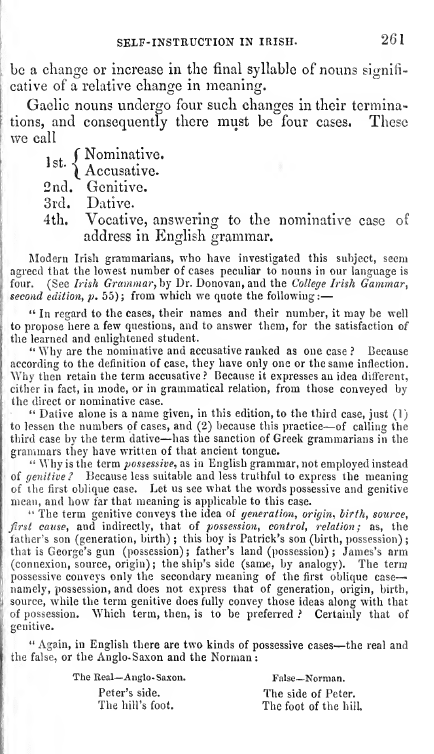
SELF-INSTRUCTION
IN
IRISH.
261
be
a
change
or
increase
in the final syllable
of nouns signifi-
cative
of
a relative
change
in meaning.
Gaelic nouns undergo
four such
changes
in their termina-
tions, and
consequently
there must be
four
cases. These
we
call
,
f
Nominative.
\
Accusative.
2nd. Genitive.
3rd. Dative.
4th. Vocative,
answering
to the nominative
case
of
address
in English
grammar.
Modern Irish
grammarians, who
have
investigated
this subject, seem
agreed that the
lowest number of cases pecuUar to nouns in our
language is
four.
(See
Irish
Grammar, by Dr. Donovan, and the College
Irish Gammar,
second
edition,
p.
55);
from
which
we
quote
the following;
—
"
In
regard to
the
cases, their
names and
their
number, it may
be well
to propose
here a
few
questions, and to
answer them, for the satisfaction
of
the learned
and
enlightened student.
"
Why are
the
nominative and accusative
ranked
as
one
case
.'
Because
according to the
definition of case, they have only one
or the
same inflection.
Why
then
retain
the term accusative ?
Because it
expresses
an
idea
different,
either in fact, in
mode,
or
in
grammatical relation,
from those
conveyed by
the direct or
nominative case.
"
Dative alone is a name
given, in this edition, to
the third
case, just
(1)
to lessen the
numbers of cases,
and
(2)
because this
practice
—of calling the
third
case by
the term
dative—has
the sanction
of Greek
grammarians
in
the
grammars
they have
written
of
that
ancient
tongue.
"
Why
is
the term
possessive, as in English grammar,
not employed instead
of genitive
? Because less
suitable and
less
truthful to
express
the meaning
of the first oblique case.
Let
us
see
what
the
words
possessive and genitive
mean,
and how
far that meaning is
applicable to this
case.
"
The term
genitive conveys
the
idea
of generation,
origin, birth, source,
first
cause, and
indirectly, that of
possession,
control,
relation;
as, the
father's son
(generation, birth) ;
this boy
is
Patrick's son
(birth, possession)
;
that is
George's
gun
(possession)
;
father's land
(possession)
;
James's
arm
(connexion, source,
origin)
;
the ship's side
(same,
by
analogy).
The term
possessive conveys
only the
secondary
meaning
of the first
obhque case-
namely, possession,
and does not express that
of generation,
origin, birth,
source, while the
term genitive
does fully convey those
ideas
along with
that
of possession. Which
term, then,
is to be preferred
? Certainly that
of
genitive.
"
Again,
in
English there
are two kinds of
possessive
cases
—the real and
j
the
false, or
the
Anglo-Saxon
and the
Norman
:
The Real—
Anglo-Saxon.
False—Norman.
Peter's
side.
The
side of
Peter.
The hill's
foot.
The foot of
the
hilL
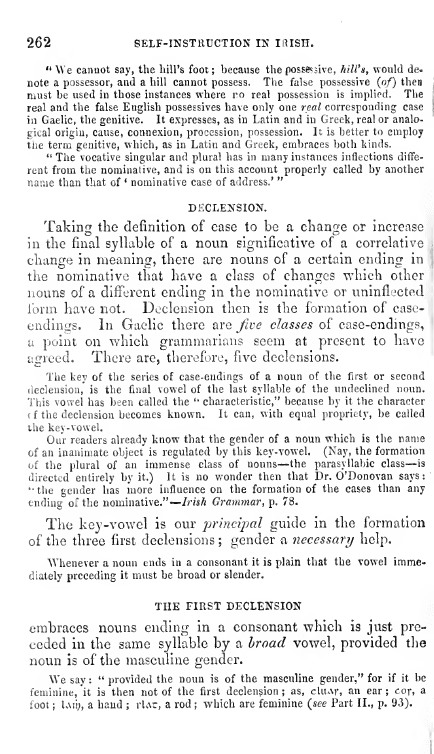
262
SELF-INSTRUCTION IN
IRISH.
"
We
canuot say, the
bill's
foot ; because tbe
possessive,
hill's,
would de-
note
a
possessor, and
a
hill
cannot possess. The false
possessive
(of)
then
must be
used in those
instances where ro real possession
is implied. The
real
and
the
false
English possessives have only one
real
corresponding case
in Gaelic,
the genitive.
It expresses,
as
in Latirv and in
Greek, real or analo-
gical
origin, cause, connexion,
procession, possession.
It
is better
to
employ
the
term genitive,
which, as in Latin
and Greek, embraces both
kinds.
"The vocative
singular and plural has
in many instances inflections diffe-
rent
from the
nominative, and is
on this account properly called by
another
name than
that
of
'
nominative case of
address.'
"
DECLENSION.
Taking
the definition of
case to be
a
change or increase
in
the
final syUable
of
a
noun
significative of
a
correlative
change
in
meaning, there are
nouns of
a
certain ending
in
'
the
nominative that have a
class of changes
which other
nouns
of
a
different ending
in the
nominative or
uninflected
form have
not.
Declension then
is the
formation of case-
endings. In
Gaelic there
are
Jive
classes of case-endings,
a
point
on
which
grammarians seem
at
present
to
have
agreed.
There are,
therefore, five
declensions.
The key
of
the
series of
case-endings
of
a
noun of
the first
or
second
declension, is the
final
vowel of
the last
syllable
of
the undeclined noun.
This
vowel
has
been called
the
**
characteristic," because
by it the character
c.f the declension
becomes
known.
It
can, with equal proprietj', be called-
the
key-vowel.
Our
readers
already
know
that the
gender
of a
noun
which
is
the name
of
an inanimate
object
is
regulated by
this
key-vowel. (Nay,
the formation
of the
plural
of
an
immense
class of
nouns
—
the
parasyllabic class
—is
directed entirely by
it.)
It is no
wonder
then that Dr.
O'Donovan says:
'
'•the gender has
more
influence on the
formation
of
the cases
than any
ending
of
the
nominative."
—
Irish
Grammar,
p.
78.
The
key-vowel
is
our
principal guide
in the
formation
of the
three
first
declensions
;
gender it
necessary
help.
Whenever
a
noun
ends in a
consonant it is plain that
the vowel imme-
diately
preceding
it
must be
broad or
slender.
THE
FIRST DECLENSION
embraces
nouns
ending
in
a
consonant
which is just pre-
ceded
in the
same
syllable
by
a
broad vowel, provided the
noun is
of the
masculine
gender.
W^e
say
:
"
provided
the
noun is
of
the masculine
gender," for
if it
I)e
feminine, it is
then not
of
the
first
declengion
;
as, cIuav,
an ear
;
cor,
a
foot;
Uri;,
a
hand
;
rUc, a
rod;
which are
feminine
(see Part
II.,
p.
93).
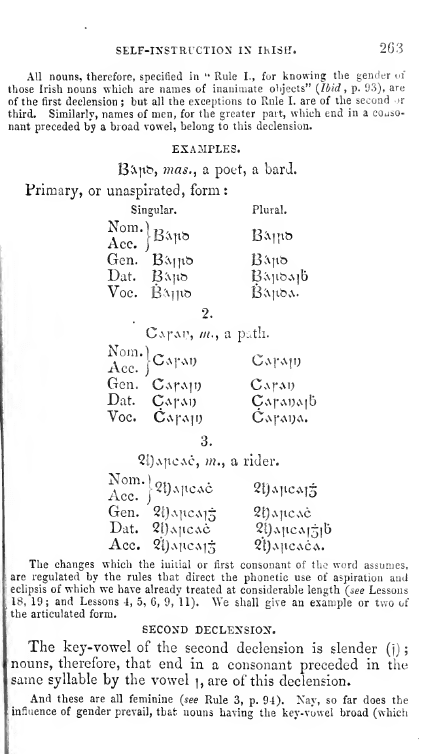
SELF-INSTRUCTION IN
IhlSH.
2G3
All nouns,
therefore,
specified
in
"
Rule
I.,
for
knowing
tbe
gender of
those
Irish
nouns which are
names of
inanimate
objects"
{Ibid
,
p. 93),
are
of the first declension
;
but
all the
exceptions to Rule I.
are of
the
second or
third. Similarly, names
of
men,
for the
greater part,
which end
in a
couso-
nant preceded
by a
broad vowel,
belong to
this declension.
EXAMPLES.
Bivjtb,
nias.,
a
poet,
a bard.
Primary,
or
unaspirated, form
:
Singular. Plural.
Ace.
P^^^^
^^^1^^^
Gen.
Bivi]tb
B^jtb
Dat. Bc\|it)
Bv\ii&v\ib
Voe.
B^^l|^í5
Bivt^bA-
2.
CvfAH,
fii-,
a
púth.
Ace.
I^^M'^^'^
Gai-ait)
Gen.
Ca|*a]1)
Catau
Dat.
CAfAu CAi'Ai^Nib
Voe.
CAfA]!)
Ca|\\i;a.
3.
21)aiiCv\c, Í??., a rider.
Nom.
)
„..
.
r>,.
Ace.
|^^>1*<^^^^
2ljATtcAi5
Gen.
2l)A|tcAi5
2t)AitcAc
Dat.
2t)A|icAC
2l)v\]tcA|5ib
Ace.
2i)v\itcAi3
2't)A|tcACA.
The
changes which
the initial
or first consonant of the word
assumes,
are
regulated
by
the
rules that
direct
the phonetic use of aspiration
and
echpsis of which we
have
already
treated at considerable length
{see Lessons
18, 19;
and
Lessons
4, 5,
6, 9, 11),
We
shall
give
an example
or two of
the articulated form.
SECOND
DECLENSION.
The key-vowel
of
the
second
declension is slender
(j)
;
nouns, therefore,
that
end
in
a
consonant preceded
in
the
same
syllable
by the
vowel
],
are
of this declension.
And
these
are all
feminine
(see
Rule
3,
p.
94).
Nay,
so far does the
influence
of
gender
prevail,
that
nouns
having
the
key-vowel broad (which
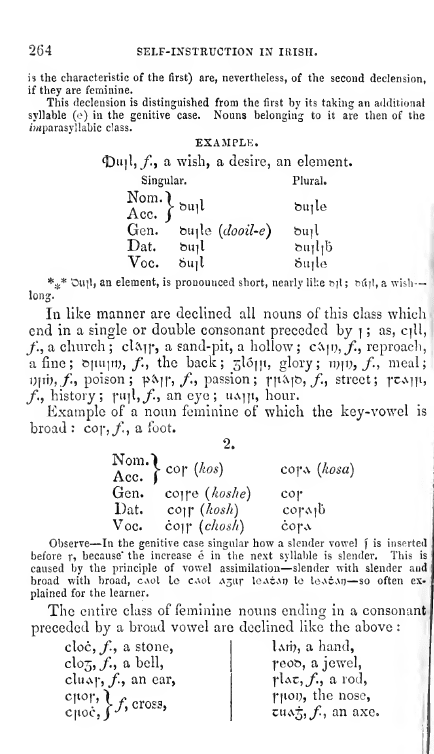
264
SELF-INSTRUCTION
IN
IRISH.
is
the
characteristic
of
the
first) are, nevertheless,
of
the
second
declension,
if
they are feminine.
This declension is distinguished
from the
first
by
its taking
an
additional
syllable
(e)
in the genitive case. Nouns belonging
to it are then
of
the
iwiparasyllabic class.
EXAMPLE.
i)u|l,
/.,
a wish,
a
desire, an
element.
Singular,
Plural.
Gen.
feu]le
{dooil-e) &u]l
Dat.
bull
biiil]b
Voc.
6ii]l
Óujle
*^*
Ouil,
an
element, is pronounced
short, nearly like sjl
;
si'iil, a
wish
—
long.
In
like manner
are declined all
nouns
of this
class which
end
in a
single or double consonant
preceded
by
]
; as, c]U,
/.,
a
cliurch;
clivif,
a
sand-pit,
a hollow;
civju,/!,
reproach,
a fine;
t>]\\\\xx),
f.,
the back; 5ló||i, glory; n^ji;),
/.,
meal;
i;1tt;,/"j
poison;
y>'<s\\',
f,,
passion;
|-|t;\i&,
/.,
street; ]XvAi]t,
/.,
history;
r"!^»/-»
^^
^ye
;
uah^»
hour.
Example
of a noun feminine
of
which
the
key-vowel
is
broad
:
coj*,^', a
foot.
2.
Nom.)
n \ n \
Acc.
]
^^'*
^
>
^^'*'^
^^^"^
Gen.
coife
(koshe) coy
Dat.
CO]
I*
(kosh)
co|*Aib
Voc.
co]f
[cliosh)
co|\v
Observe
—In
the
genitive
case singular hove
a
slender vowel
f
is
inserted
before
Xi
because"
the
increase
é in the
next
syllable
is slender. This
is
caused by
the
principle of
vowel
assimilation—
slender with
slender
and
broad
with
broad, caoI
Lo
caoI
Asiir
leAcAi) lo
IcACAp
—so
often
ex-
plained
for
the learner.
The
entire
class
of
feminine nouns ending in
a
consonant
preceded by
a
broad vowel
are declined
like
the
above
:
cloc,
f.^
a
stone,
clo3,
/.,
a
bell,
cluA]-,
/.,
an ear,
CHOI-,
;;}^
crosa,
lv\rb,
a
hand,
feob,
a
jewel,
flAc,^.,
a
rod,
ffioi},
the nose,
cuA5,y^,
an axe.
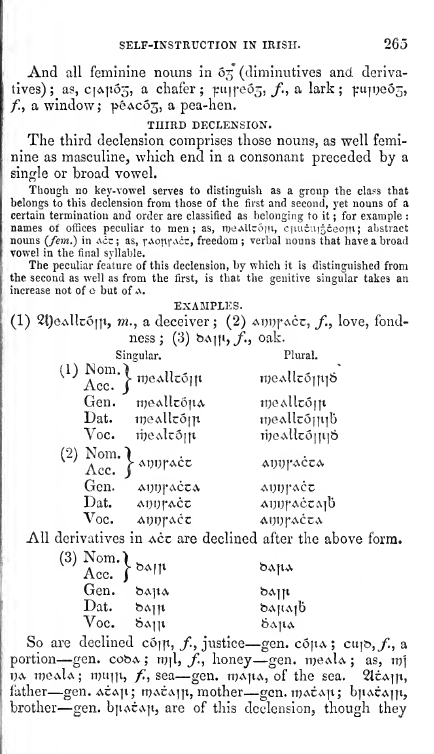
SELF-INSTRUCTION
IN IRISH.
265
And
all feminine nouns in
65
(diminutives
and deriva-
tives)
;
as,
CIA11Ó5,
a
chafer; ^ii]]'e6^,
f.,
a
lark; ^U]r)eó5,
/,
a
window
;
péACój, a
pea-hen.
THIRD
DECLENSION.
The third declension
comprises those nouns,
as
well
femi-
nine
as
masculine,
which end in a
consonant
preceded by
a
single
or
broad vowel.
Though
no key-vowel
serves
to
distinguish
as
a group the
class that
belongs
to
this declension
from those of
the first and
second,
yet
nouns of a
certain
termination and
order
are
classified as
belonging
to
it ; for
example
:
names
of
offices
peculiar
to men;
as, njeAllcom,
cfiucuiaceont;
abstract
nouns
(fern.)
in
acc;
as,
TAorii\^ic,
freedom;
verbal
nouns
that
have a
broad
vowel in the final syllable.
The peculiar feature
of
this declension,
by which
it is distinguished
from
the
second as well as from
the first, is
that
the genitive singular
takes an
increase not
of
e
but
of
a.
EXABIPLES.
(1)
2l)eAllcói|t,
m.,
a
deceiver;
(2)
Aijr^fACC,
/.,
love, fond-
ness
;
(3)
bAjft,
/.,
oak.
Singular.
Plural,
A
1
t>eAllcói|i
Tt9eAllc5i]t]6
Gen.
Tt)eAllcó|tA
ri^eAllcofii
Dat.
tr)eAllcói|i
n)eAllc5iii]b
Voc.
TbeAlcóijt
TrjeAllcóiii^ó
(2)
Nom.
\
Acc.
l^^^^T^^^
AWj-ACCA
Gen.
AT;r)fACCA
at)tj|*acc
Dat.
AUUfACC
AIJOfACCAlb
Voc.
AT;r)|'ACC
At^lJfACCA
All derivatives in acc
are declined
after the above form.
(3)
Nom.)
^
Acc.
[
^^^^
^^^^
Gen. bAjtA
feAi|i
Dat. b^]|i
bAftAjb
Voc.
6A]|t
6a|ia
So
are declined
c5i|i,
_/!,
justice
—
gen.
coitA
;
cu]i>,y.,
a
portion
—
gen.
cobA
;
n)]\,
/.,
honey
—
gen.
Tr)eAlA
;
as, it)]
T)A
idcaIa;
n)U]|t,
f.,
sea
—
gen. ti^AjiA,
of the
sea. 2Lt-\]}i,
father
—
gen. acaji;
idacajiv,
mother
—
gen.
TtjACAjt ;
bjiACAiji,
brother
—
gen.
b|tACA]tj
are
of this
declensionj though they
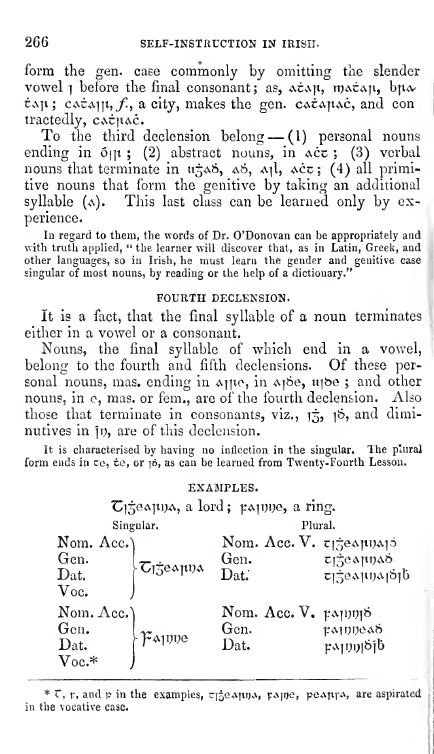
266
SELF-INSTRUCTION
IN IRISH.
form
the gen. case commonly
by
omitting the
slender
vowel
1
before
the
final
consonant
; as,
acajx,
n)<\CA]i, b]t<v
CA|i;
C4<t^]]x,f.,
a city, makes
the
gen.
CACA|tAc,
and
con
tractedly,
cacii<\c.
To
the third
declension belong
—
(I) personal nouns
ending
in 6\]i
;
(2)
abstract
nouns,
in acc
;
(3)
verbal
nouns
that terminate in
U5A6,
a6,
a^I, acc
;
(4)
all
primi-
tive nouns that form
the
genitive
by
taking an additional
syllable
(a).
This last class
can be
learned only
by
ex-
perience.
In regard to them,
the
words
of Dr. O'Donovan can be
appropriately and
with truth applied,
"
the
learner will
discover
that, as in Latin,
Greek, and
other
languages,
so in Irish,
he must learn
the gender and
genitive case
singular
of most nouns,
by
reading
or
the help
of a
dictionary."
FOURTH DECLENSION.
It
is
a fact, that the final syllable of
a
noun
terminates
either
in
a
vowel
or
a
consonant.
Nouns, the final syllable
of
which end in
a
vowel,
belong to the fourth and fifth declensions. Of
these per-
sonal nouns, mas. ending in
Aj^te, in
A^óe,
ii]&e
;
and
other
nouns, in e, mas.
or
fem.,
are of
the fourth
declension.
Also
those
that terminate in consonants,
viz.,
15,
16,
and
dimi-
nutives in
]\),
are of this
declension.
It
is characterised by having no inflection in the singular.
The
plural
form ends in ce, ce, or
ló,
as can be learned from
Twenty-Fourth
Lesson.
EXAMPLES.
"C^jeAjirjA,
a
lord
;
^a^vvq»
a
ring.
Singular.
Nom. Acc.
'CiSeAjtijA
pAit)ije
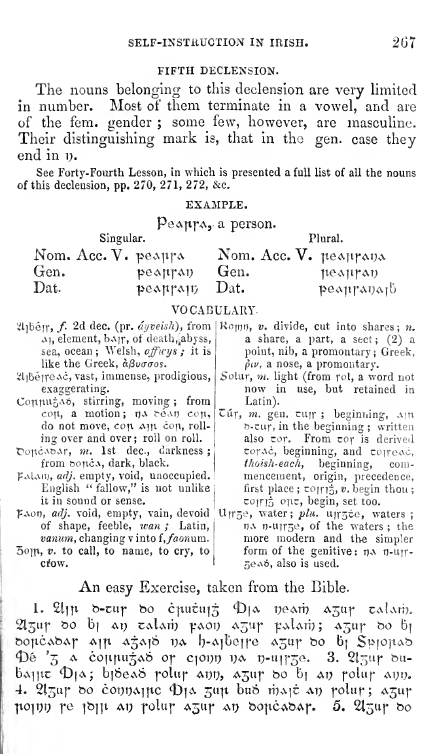
SELF-INSTRUCTION
IN
IRISH.
267
FIFTH
DECLENSION.
The
nouns
belonging
to
this
declension
are very
limited
in
number.
Most of
them terminate
in
a
vowel, and
are
of the
fem. gender
;
some few,
however,
are
masculine.
Their
distinguishing
mark is,
that
in the
gen.
case they
end
in
i).
See
Forty-Fourth Lesson,
in which is
presented
a full list of all
the nouns
of this declension,
pp.
270,
271, 272,
&c.
EXAMPLE.
PeA|t]*A, a person.
Singular.
Plural.
Norn. Ace.
V.
-peAitf
A
Nom,
Ace. V.
|teA]tfAnA
Gen. peAftj-Ai) Gen.
-fteAti]*AT)
Dat. peA|tf*A]iy Dat.
peAji^AUAib
VOCABULARY.
2l]béiv,
f-
2d
dec.
(pr.
ayveish), from
A],
element,
bAjr, of
death.iabyss,
sea,
ocean
;
Welsh,
affwys ;
it
is
like
the Greek, a/Suo-o-os.
y.lbéire..\c,
vast, immense, prodigious,
exaggerating,
CotiT^uíiAb,
stirring, moving
; from
co|t,
a
motion;
tjA fé.vn co\\,
do not move,
co^i
Am
co|i,
roll-
ing over
and over ;
roil on
roll.
t^oficAbAr,
m.
1st dec, darkness
;
from &oitCv\,
dark, black.
pAlAiij,
adj.
empty,
void, unoccupied.
English
"
fallow,"
is
not unlike
it in sound or sense.
]:Aon,
adj.
void,
empty,
vain, devoid
of
shape, feeble,
^van
;
Latin,
vanum,
changing
v into f,/fl07ium.
5o]tt,
V. to call,
to
name, to cry, to
CÍOW.
Rojnn, V.
divide, cut
into
shares
; n.
a
share,
a
part,
a sect;
(2)
a
point, nib,
a promontary;
Greek,
piv, a
nose,
a
promontary.
Solur,
m.
light
(from
fol, a
word not
now
in use, but
retained in
Latin).
Cuf,
m. gen.
cujr
;
beginning,
Ajn
b-cur, in
the
beginning
;
written
also
cor.
From
cor
is derived
cofAc, beginning,
and
co]reAc,
thoish-each,
beginning,
com-
mencement, origin,
precedence,
first place
; coirio,
v.
begin thou
;
cojno
OTIC,
begin,
set too.
Ujrse,
water; plu.
ujrsce,
waters
;
t)A
T)-uir5e,
of the
waters
;
the
more modern
and
the
simpler
form of the
genitive:
i)A
n-ujr-
.;^eAó, also
is used.
An
easy
Exercise,
taken
from
the
Bible.
1.
£l]|i
b-cu|*
bo c|tucu]5 Í)|a T)eArb
A5Uf
caIatt?.
2I5UI'
bo
b|
Ar) caIatt) |:aoi)
a5U|*
-pAlArb; A5U|*
&o
b|
foojiCAbAf
A]|i
A5A16
t)A
b-Ajbeife A5Uf
bo
b; Sp|0]tAb
í)é
'5
A
co|tftu5A6
ox
cioi)t)
i;a T)-u]]-3e.
3.
2l5uf
bu-
bA]ixc
*t)|Aj b]6eA6
]*olup
at)1),
Ajuf
t)0
h\
At)
foluf
Ai;r).
4.
2l5uj*
ho
coi)r)Ai|ic
«D^a
5U]i bu6
YO^\t
at)
foluf;
A5u|*
1t0]t)p
]*e
]b]]t
Ai)
Toluj-
A5Uf
AT) bo]tcAbA]*. 5.
2l5U|* bo
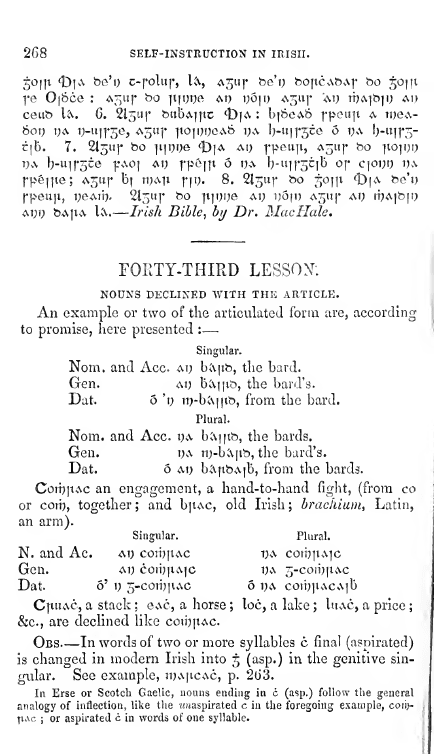
268
SELF-INSTRUCTION IN
IRISH.
^o\p.
«DjA
^e'l)
c-foluj',
lix,
A3U|*
be'
J)
boitc<,\bAf
bo
50111
ye 0|óce ;
A^uf
bo
jifwe
at)
t)5iu
a^hj* ai)
TÍ7<V]b]t)
ad
ceub
liv.
6.
2l5iif
bubA^jtc
Í)ia
:
bibeAÓ
fpeuji
a
meA-
6or) i:)A
r)-ui|'5e,
a5u]*
]toii)i)eA6
t;a
l)-u|]'5ce
ó t)A
b-ii]f5-
rib.
7.
2Í5U|* bo
]X]me
Í)ia
ai)
fpeujv, A3iif
bo
itojou
t;a
b-iMt'S*^^
V'-'^^]
^^^
T*?*^!!^
^
'^'^
b-u]t*5cib
oy
c]Ovt)
i)v\
rpé||ie;
A5u|' b]
n)Ait
i^p).
8. 21511}*
bo
50]ii
í)|<v
be'u
fpeujt,
i;eAib'
2l5iif
bo
|t]i)ue
ad
dó|D A5Uf
ad
ib<^lbiD
ADD
bA]iA U\.
—
Irish Bible, hy Dr. MacHale.
FOPiTY-THIRD
LESSON.
NOUNS
DECLINED
WITH THE
ARTICLE.
An
example or two
of
the articulated
form
are, according
to promise, here presented
:
—
Singular.
Nom.
and Ace.
ad
bivjib, tlie bard.
Gen.
AD
b^iivb,
the bard's.
Dat. Ó
'd
rD-b<\|jib, from the bard.
Plural.
Nom. and Ace.
d<v
bCvuib, the
bards.
Gen.
DA
n^-bCviib,
the
bard's.
Dat.
5
AD
b^|tbA|b,
from the bards.
CoTb]iAC
an engagement,
a
hand-to-hand
fight,
(from
co
or
cotb,
together
; and
b]iAC, old Irish ;
brachium, Latin,
an
arm).
Singular.
Plural.
N. and
Ac.
ad
corbftAC
t)A
corb|tAic
Gen.
AD
cori)|tAic
DA
5-coti)iiAC
Dat.
Ó'
D
5-coTÍ)]iAC 5
DA
con)|iACAib
CjiuAc,
a
stack ;
eAC, a horse
;
loc,
a
lake
; Iuac, a
price
;
&c.,
are
declined like
coiijjtAC.
Obs
—
In words
of two or
more syllables c
final
(aspirated)
is
changed
in
modern Irish into
5
(asp.) in the
genitive
sin-
gular.
See
example,
n^\|lCAC,
p.
263.
In
Erse
or
Scotch Gaelic,
nouns
ending in c (asp.)
follow the
general
analogy of
inflection, like
the Muaspirated c
in the foregoing example,
cony-
tiAc
;
or
aspirated
c
in words of
one syllable.
